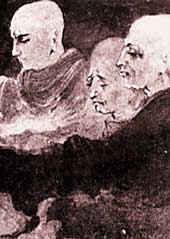We serve a ferocious master
 |
Apon Katha: My story (Tara, £5.99) by Abanindranath Tagore is Rimi B. Chatterjee’s excellent translation of a memoir by Rabindranath’s nephew, a brilliant and avant-garde painter, writer and aesthete. Chatterjee’s English conveys the fineness and whimsicality of Abanindranth’s Bengali, making this delightful, but elegiac little book an important literary work and historical document. Tapati Guha Thakurta’s foreword sketches out the nationalist and cultural contexts, while the translator’s note lucidly lays out her working principles.
Collected poems: 1954-2004 (Penguin, Rs 395) by Dom Moraes is a testimony to the acuteness of the poet’s self-criticism — “my facility was my own worst enemy”. Inspired by the Auden generation, Moraes’s poetry is close to the spirit of Spender’s verse — technically accomplished, intelligent, enjoyable, but somehow a minor voice that falls short of the abiding brilliance of Auden or Macneice: “Travel with me on the long road/ into loneliness, where the hours/ offer pardons to those still afraid.” There is the Auden music in these lines, but without the rich difficulty of Auden’s early English phase. Yet there is ample evidence, in this collection, of the sincerity of Moraes’s apprenticeship to poetry: “We serve a ferocious master.
 |
Heat and dust (John Murray, Rs 200) by Ruth Prawer Jhabvala is the reprint of a rather enjoyable and photogenic piece of postcolonial Orientalism, first published in 1975, and then filmed by Ivory and Merchant in the early Eighties. The Jhabvala-Ivory-Merchant versions of India’s colonial past, and of the resurgences of that past in the lives of a more modern generation, have a certain sepia-saccharine charm, more cinematic than literary. Here, the Forsterian Olivia — beautiful, bored and married to a civil servant — outrages smalltown Satipur society by eloping with an Indian prince. Half a century later, Olivia’s step-granddaughter goes back to the eponymous heat and dust of the bazaars to fathom the mystery of Olivia’s scandal. “What was she like? How did she live? Looking around her house above X, it strikes me that perhaps she did not live very differently from the way she had done in Satipur, and might have done in London.”











